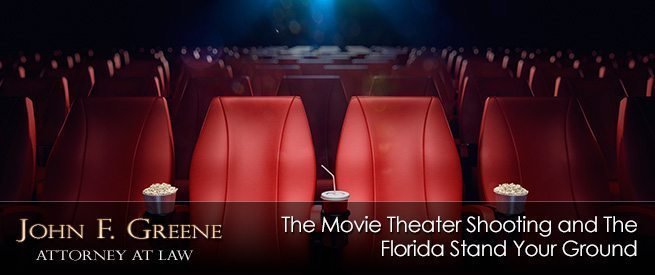
On January 25, 2015, a five-day “stand-your-ground” hearing is scheduled to begin in the case of former police captain, Curtis Reeves. The charges stem from the shooting death of Chad Oulson by Reeves in a Tampa movie theater in January 2014.
Reeves and his wife, as well as Oulson and his wife, were all waiting for a movie to start when an argument broke out between the two men. The details are not clear, but allegations are that Oulson was texting, which disturbed Reeves. The two men apparently engaged in a shouting match when Oulson threw popcorn at Reeves. Reeves then pulled out his gun and shot Oulson in the chest. Oulson was rushed to the hospital where he was pronounced dead.
Reeves is also charged with assault and battery based on a gunshot wound sustained by Oulson’s wife when she apparently put her hand out to try and block the bullet from hitting her husband. The stand-your-ground hearing is to consider whether those charges should also be dropped.
Self-Defense or Stand-Your-Ground
Prior to the enactment of the Stand-Your-Ground law in 2005, defendants charged in Florida with a violent crime who claimed they had no choice but to use deadly force against an aggressor could claim self-defense at trial. Traditional self-defense laws only allowed enough force to be used that was necessary to stop the attack. The one being attacked had to try and retreat from the attack before using force. The defendant also had to show that, under the circumstances, a reasonable person would have feared for his or her life.
Application of the Florida Stand-Your-Ground Law
A Stand-Your-Ground defense may be presented at a pretrial hearing instead as a defense during a regular trial. If the retired Reeves, who was 71 years old at the time of the incident, is successful and wins at his pre-trial hearing, not only will he be a free man immune from prosecution, Oulson’s wife and children will not be able to bring a civil wrongful death claim against Reeves.
All Reeves needs to prove at that hearing, by a preponderance of the evidence, is that he was:
- In a public place where he had a legal right to be.
- He was afraid that Oulson was going to cause him severe bodily harm or death.
Reeves had no duty to retreat from danger or escape to a safe place. He was not limited to any amount of force he could use to protect himself. There is also no requirement for him to prove that his fear was reasonable.
If you used force to defend yourself and are now charged with a crime of violence, contact Destin Florida defense attorney John F. Greene. He has more than 30 years of experience working with defendants in both state and federal courts. He is committed to his clients and will fight vigorously for the charges to be dismissed or, at a minimum, to have the penalties reduced. He is an experienced trial attorney and if the best option in your case is to proceed to trial, you can feel confident having him represent you in the courtroom.
Attorney Greene’s office is located in the City of Destin and he serves all those along the Emerald Coast, specifically the Crestview, Destin, DeFuniak Springs, Fort Walton Beach, Niceville and Panama City Beach areas. Contact attorney John F. Greene either online or call 850-424-6833 to schedule a consultation.









